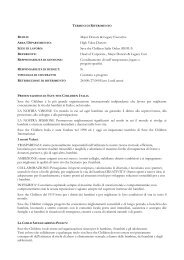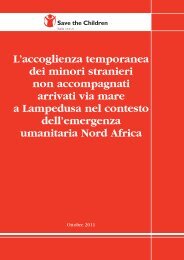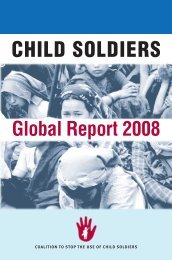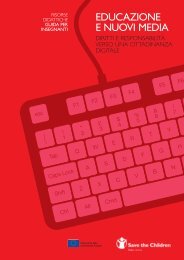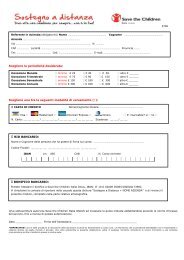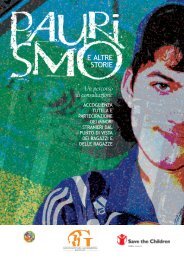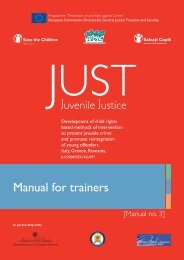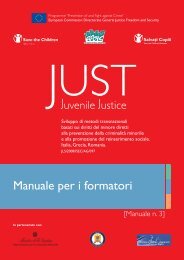IIPART4438The amended PenalCode entered into forceon 1 October 2002.<strong>FINAL</strong> <strong>REPORT</strong>Development of a Child Rights Methodology to Identify and Support Child Victims of Traffickingbeing identified as a victim of trafficking; that specific measures of protection should be adoptedin light of <strong>the</strong> child’s condition of increased vulnerability in <strong>the</strong> case he/she is a victim.NATIONAL LEGAL FRAMEWORKS AND PRACTICESOR METHODOLOGIES FOR IDENTIFICATIONAND SUPPORT OF CHILD VICTIMSBULGARIANational Legal FrameworkTwo are <strong>the</strong> legal measures available at national level dealing with human trafficking, <strong>the</strong>amended Penal Code 38 and <strong>the</strong> Law on <strong>the</strong> Fight against Illegal Trafficking of Human Beings.• Penal code: at Chapter 2 “Crimes against person”, Section IX “Human trafficking” <strong>the</strong>following sections criminalise activities relevant to human trafficking:- art. 142, 142a, 156 - kidnapping and illegal deprivation of liberty, including on purpose toprovide for debauchery;- art. 155 - establishment and maintaining of “places of debauchery”, and provoking someoneinto prostitution;- art.188 - restraining of juveniles for prostitution.• Law on <strong>the</strong> Fight against Illegal Trafficking of Human Beings: more specific crimes arecontemplated in this instrument. In particular, art.159(a) provides that <strong>the</strong> “ga<strong>the</strong>ring,transporting, concealing or agreeing to participate in <strong>the</strong> exploitation of individuals or groupsfor debauchery purposes, forced labour, sale of organs or deprivation of a person’s libertyagainst <strong>the</strong>ir will” is a crime. It fur<strong>the</strong>r considers specific cases when <strong>the</strong> crime is performedunder certain aggravating conditions, such as:a) <strong>the</strong> victim is under 18 years;b) through constraint or fraud;c) through kidnapping and illegal deprivation of liberty;d) through exploitation of a person’s addiction;e) through misapplication of power;f) through promising, giving or obtaining advantages.Finally, article 159(b) punishes <strong>the</strong> illegal transportation, concealment or transfer of personsthrough borders.Practices or Methodologies for Identification and Supportof Child VictimsIn 2005, <strong>the</strong> State Agency for Child Protection toge<strong>the</strong>r with <strong>the</strong> International Organization forMigration, initiated <strong>the</strong> elaboration of a Coordination Mechanism for referral of cases and duecare of both unaccompanied Bulgarian children and children - victims of human trafficking when <strong>the</strong>yreturn home from a stay abroad (hereinafter, <strong>the</strong> Coordination Mechanism). Bulgaria ispredominantly a country of origin and a transit country for human trafficking, and this is <strong>the</strong>reason why this mechanism has been created mainly to meet <strong>the</strong> needs of victimised childrenreturning from a foreign country. It is through this mechanism that <strong>the</strong> necessary uniformity ofapproach by <strong>the</strong> various Bulgarian institutions is achieved when launching coordinated actions incases such as <strong>the</strong>se. At <strong>the</strong> same time, this mechanism clearly distinguishes <strong>the</strong> responsibilities ofindividual institutions for effective law enforcement in combating human trafficking, including<strong>the</strong> undertaking of respective measures against a possible repetition of human trafficking ofchildren who have already been repatriated to Bulgaria.The system for inter-institutional case referral outlined above, in its capacity as a coordinatingmechanism, has been designed to meet <strong>the</strong> following objectives:• to regulate <strong>the</strong> specific obligations for mandatory interaction of <strong>the</strong> entities involved in all caseswhen care should be provided to <strong>the</strong> children concerned;• to follow up each specific case in a comprehensive, rapid and effective manner;• to establish <strong>the</strong> child’s identity and investigate <strong>the</strong> reasons for his/her going abroad;• to investigate <strong>the</strong> child’s family and social environment for <strong>the</strong> purpose of implementingmeasures in his/her best possible interests.The stages, which each individual case of care provision in Bulgaria goes through, are as follows:• establishing <strong>the</strong> identity of <strong>the</strong> child and <strong>the</strong> reasons for which he/she is travelling abroad;• overall investigation of <strong>the</strong> specific case;• preparation of a social report;• application of <strong>the</strong> relevant protection measure;• drafting an individual plan for care provision;• organisation of <strong>the</strong> child’s return to Bulgaria;• follow-up of <strong>the</strong> case in point.The following good practices have been established with <strong>the</strong> implementation of <strong>the</strong> CoordinationMechanism in <strong>the</strong> Republic of Bulgaria:• a temporary passport is immediately issued to <strong>the</strong> child at his/her location abroad, irrespectiveof <strong>the</strong> ambiguous data collected with respect to his/her identity;• <strong>the</strong> child is not turned over to parents and/or relatives before <strong>the</strong> proper investigation of his/herfamily environment has been completed and <strong>the</strong> respective social report has been prepared;• <strong>the</strong> initial signalling of each individual case should contain mandatory information about <strong>the</strong>reasons for <strong>the</strong> child’s detention, i.e. <strong>the</strong>ft, begging, prostitution, etc.;• written evidence should be provided in connection with each individual case such asdocuments from police authorities, reports from crisis centres, etc.;• as much information as possible should be provided in connection with <strong>the</strong> child concerning:his/her health and emotional status, attitude towards his/her return to <strong>the</strong> native country,opinions of professionals who have worked with <strong>the</strong> child during his/her stay abroad, etc.Some problems deriving from <strong>the</strong> implementation of <strong>the</strong> Coordination Mechanism have beingidentified below.At <strong>the</strong> central level, <strong>the</strong> Coordination Mechanism performs satisfactorily and ensures <strong>the</strong> interactionof <strong>the</strong> various institutions involved, but problems still exist at <strong>the</strong> local level in connection with <strong>the</strong>clarification of <strong>the</strong> respective functions and authority of <strong>the</strong> individual multi-disciplinary teams. Atpresent, <strong>the</strong> Coordination Mechanism is being updated and amended by <strong>the</strong> expert team on <strong>the</strong>national level with a view to encompassing both <strong>the</strong> recently established Crisis Centres in Bulgariaand <strong>the</strong> concrete steps prescribing what care should be provided to <strong>the</strong> children at <strong>the</strong> local level.A major problem with <strong>the</strong> Bulgarian legislation is <strong>the</strong> scope for different treatment and approacheson <strong>the</strong> part of <strong>the</strong> competent institutions with respect to a child victim of trafficking. For instance,<strong>the</strong> police being mainly interested in <strong>the</strong> crime committed in connection with <strong>the</strong> child, is deprivedof major functions concerning <strong>the</strong> child’s protection. The prosecutor’s office works on collectingevidence about <strong>the</strong> crime but again has nothing to do with <strong>the</strong> child’s protection. This places <strong>the</strong>child in <strong>the</strong> awkward situation of not being treated unequivocally, and <strong>the</strong> approach to such a childdiffers, e.g. from treating him/her as a victim to treating him/her as a criminal.Thus far, Bulgaria lacks a uniform system of indicators universally accepted by all key institutionsinvolved with solving cases of child trafficking, both to identify children who have fallen victimsof human trafficking and children subject to <strong>the</strong> risk of being trafficked.Fur<strong>the</strong>rmore, <strong>the</strong>re are insufficient numbers of specialists trained to work with victims of humantrafficking. What is also lacking is a register of specialists capable of providing expertise andlending assistance. In addition, a mechanism to financially support <strong>the</strong> activities connected withbringing home child victims of trafficking from abroad has not been set up yet. There have alsobeen insufficient cases in which administrative and penal proceedings have been initiated againstparents involving <strong>the</strong>ir children in human trafficking.GERMANY<strong>FINAL</strong> <strong>REPORT</strong>Development of a Child Rights Methodology to Identify and Support Child Victims of TraffickingNational Legal FrameworkHuman trafficking of children and forms of intervention and support of victims are object ofdifferent parts of <strong>the</strong> German legislation. With regard to <strong>the</strong> criminal prosecution of childtrafficking <strong>the</strong> Strafgesetzbuch, <strong>the</strong> German Criminal Code, is <strong>the</strong> central part of <strong>the</strong> GermanIIPART45
IIPART46<strong>FINAL</strong> <strong>REPORT</strong>Development of a Child Rights Methodology to Identify and Support Child Victims of Traffickinglegislation. In general, all forms of intervention and support of child victims are regulated by <strong>the</strong>Kinder- und Jugendhilfegesetz, <strong>the</strong> German <strong>Children</strong> and Youth Welfare Law. The special situation ofminors from non-EU countries is addressed by <strong>the</strong> Zuwanderungsgesetz, <strong>the</strong> German ImmigrationAct, and its single parts, namely <strong>the</strong> Aufenthaltsgesetz, <strong>the</strong> Asylverfahrensgesetz and <strong>the</strong>Asylbewerberleistungsgesetz. The Aufenthaltsgesetz regulates <strong>the</strong> right to enter and stay in Germany fornon-EU citizens. The Asylverfahrensgesetz does <strong>the</strong> same for asylum seekers. Levels and types of socialservices for asylum seekers and tolerated foreigners in need are provided in <strong>the</strong>Asylbewerberleistungsgesetz.Due to complementary legislation and competences of local, regional and federal administrationthat can differ according to each Bundesland (German state), <strong>the</strong> actual implementation of <strong>the</strong>legal framework can vary.• Strafgesetzbuch - Criminal CodeIn <strong>the</strong> Criminal Code, section 18-Criminal Acts Against Personal Freedom, human trafficking for<strong>the</strong> purpose of sexual exploitation (section 232) and human trafficking for <strong>the</strong> purpose offorced labour (section 233) are listed as criminal acts. O<strong>the</strong>r criminal acts in <strong>the</strong> context ofhuman trafficking, like <strong>the</strong> promotion of human trafficking (section 233a), kidnapping(sections 234 and 34a), deprivation of liberty (section 239), blackmail (section 239a) andtaking of hostages (section 239b) are also indicated. The paragraphs on human trafficking(sections 232 and 233) concern human beings in general, not only children. However, insubsection 3 it provides for harsher sentencing where child victims are involved (minimum ofone year instead of 6 months imprisonment).Sections 232 and 233 have a problematic limit, which is that <strong>the</strong> stay of <strong>the</strong> victim in a foreigncountry needs to be part of <strong>the</strong> trafficking and exploitation process. In section 233 bothreducing a person to slavery, serfdom or peonage and subjecting a person to a forced laboursituation are contemplated. However illegal activities and begging are not mentioned as typesof exploitation anywhere in <strong>the</strong> Criminal Code.• Aufenthaltsgesetz - Law concerning <strong>the</strong> entrance and stay of foreign citizens in GermanyThe Aufenthaltsgesetz at sections 5 and 25, subsection 4a, provides that a foreigner who isconsidered a victim as per sections 232, 233 and 233a of <strong>the</strong> Criminal Code, may remaintemporarily in Germany even if he/she would normally be obliged to leave Germany. This isonly possible, if: his/her temporary presence in Germany is useful for criminal prosecution,because without his/her information <strong>the</strong> detection of <strong>the</strong> crime would be more difficult; he/shecuts off any contact to any person who is accused of <strong>the</strong> crime in question; and he/she hasdeclared his/her willingness to give testimony in <strong>the</strong> legal procedure.If a foreign citizen obtains legal status of stay and residence in Germany he/she is <strong>the</strong>n eligiblefor integration services (sections 43-45).In section 49 <strong>the</strong> assessment and documentation of <strong>the</strong> identity of foreigners is addressed. If<strong>the</strong>re are doubts concerning <strong>the</strong> person, <strong>the</strong> life age or <strong>the</strong> nationality different measures foridentification should be applied under certain prerequisites and circumstances. This could bephotographs, finger prints, or even medical acts as long as it does not imply any disadvantagefor <strong>the</strong> health of <strong>the</strong> foreigner. Measures for identification may only be applied to persons whoare 14 years old and older.According to section 80, an adolescent of 16 years of age or over has legal capacity to face <strong>the</strong>procedures contemplated by Aufenthaltsgesetz although unassisted, including representinghimself/herself in court proceedings. This is also true of procedures under <strong>the</strong>Asylverfahrensgesetz (section 12). Being under 18 years of age does not imply that <strong>the</strong> minorcannot be denied permission to stay or be returned to his/her country of origin. For all foreignchildren under 16 years of age, legal guardians must take care of all legal procedures.Practices or Methodologies for Identificationand Support of Child VictimsLegal procedures and part of <strong>the</strong> general practice of identification and support of victims ofchild trafficking and exploitation in Germany is described in <strong>the</strong> section on <strong>the</strong> legalframework in Germany.Generally speaking, preliminary criminal proceedings against acts of child trafficking are triggeredby controls of <strong>the</strong> police, complaints of victims and notification and reports by third persons. So<strong>FINAL</strong> <strong>REPORT</strong>Development of a Child Rights Methodology to Identify and Support Child Victims of Traffickingfar complaints of victims and notification and reports by third persons play a smaller role becauseof ei<strong>the</strong>r <strong>the</strong> vulnerability and helplessness of victims (which is greater <strong>the</strong> younger <strong>the</strong> minor is)or because of <strong>the</strong> lack of knowledge and awareness of <strong>the</strong> phenomenon among stakeholders or <strong>the</strong>general public.It is perhaps <strong>the</strong> close link between child trafficking for <strong>the</strong> purpose of sexual exploitation andsexual exploitation in <strong>the</strong> red light milieu, which is <strong>the</strong> reason that <strong>the</strong>re is more information onthis type of exploitation in Germany. Law enforcement personnel implement control actions in <strong>the</strong>milieu and begin investigations based on <strong>the</strong>ir preliminary findings and insight of <strong>the</strong> problem.In <strong>the</strong> field of women trafficking, in past years law enforcement and NGOs have agreed oncooperation in many states of Germany which has improved <strong>the</strong> protection of witnesses andvictims. The results of <strong>the</strong> project research give <strong>the</strong> impression that some of <strong>the</strong>se cooperationmodels which are currently in place for foreign teenage girls who prostitute <strong>the</strong>mselves, haveextended <strong>the</strong>ir scope to cases of minor victims. Due to <strong>the</strong> circumstances and <strong>the</strong> history of <strong>the</strong>cooperation this is mostly still limited to minors who are older than 14 years and sexualexploitation. Examples for this are <strong>the</strong> counselling center Nachtfalter that belongs to <strong>the</strong> CaritasAssociation of <strong>the</strong> diocese of Essen, <strong>the</strong> project Jadwiga of <strong>the</strong> NGO STOP dem FrauenhandelgGmbH in Munich or <strong>the</strong> counselling center of <strong>the</strong> NGO IN VIA of <strong>the</strong> diocese of Berlin. Thecounselling center Nachtfalter even developed a method for sharing professional opinions,perspectives and biases on <strong>the</strong> particular problem of human trafficking across differentprofessional disciplines. At <strong>the</strong> core of such agreements on cooperation is a clear distribution ofroles and tasks between law enforcement and NGOs. Although <strong>the</strong>y follow different mandates<strong>the</strong>y cooperate for <strong>the</strong> protection of <strong>the</strong> witness.Principles of <strong>the</strong> cooperation models are mutual respect and respect of <strong>the</strong> different tasks involved.The common goal is <strong>the</strong> improvement of <strong>the</strong> victim`s situation. Essential to <strong>the</strong>ir success is thattowards <strong>the</strong> victim <strong>the</strong>re is a clear distinction between law enforcement agents and NGOs.Potential victims lack trust towards law enforcement agents. However <strong>the</strong> police often rely on <strong>the</strong>victim´s information and testimony in order to prosecute <strong>the</strong> crime of human trafficking. In <strong>the</strong>past many criminal proceedings of cases of human trafficking ended as cases of smuggling becausevictims were not willing to give testimony against <strong>the</strong> perpetrators.As first state of Germany, in 2007, Berlin established a specific Kommissariat for humantrafficking of minors within <strong>the</strong> bureau of criminal investigation of Berlin. It is <strong>the</strong> firstKommissariat to explicitly address <strong>the</strong> phenomenon of child trafficking with regard to all types ofexploitation. In <strong>the</strong> hierarchical structure of <strong>the</strong> bureau of criminal investigation child traffickingis no longer subsumed under human trafficking, sexual abuse or o<strong>the</strong>r crimes. The Kommissariatcan build upon an experienced model of cooperation with <strong>the</strong> NGO IN VIA and o<strong>the</strong>rstakeholders in Berlin in <strong>the</strong> context of women trafficking and support of foreigners. For <strong>the</strong>Kommissariat it is still too early to evaluate trends, tendencies or <strong>the</strong> results of <strong>the</strong>ir work. But forall stakeholders in Germany it will be enriching to learn from <strong>the</strong>ir medium-term and long-termexperiences.Cooperation between NGOs, law enforcement and child and youth welfare departments has along tradition regarding all different kinds of risk factors and exploitative situations for minors.Cooperation between NGOs, child and youth welfare departments and departments for foreignerscan also look back on a common tradition. However, so far child trafficking has not been aprevalent problem in <strong>the</strong> daily work of <strong>the</strong>se stakeholders. In addition, <strong>the</strong> child and youthwelfare departments are not responsible for certain foreign minors, or at least <strong>the</strong>y do not feelresponsible.The Action Plan 2005-2010 for a “child-adequate Germany” intends and suggests clearing servicesfor unaccompanied foreign minors. Following <strong>the</strong> suggestion of <strong>the</strong> action plan, clearing houseswere established in some cities and regions, e.g. in Berlin, Frankfurt, Nürnberg, etc. The provisionof clearing houses is not yet exhaustive for Germany and is not based on uniform standards.NGOs and civil groups like <strong>the</strong> Landesarbeitsgemeinschaft Jugendsozialarbeit Bayern and <strong>the</strong>Bayerischer Jugendring have given recommendations in this regard. The BundesfachverbandUnbegleitete Minderjährige Flüchtlinge e. V., a federal association of organisations working onbehalf of unaccompanied minor refugees, has developed standards and guidelines for such clearingprocedures and services.IIPART47




